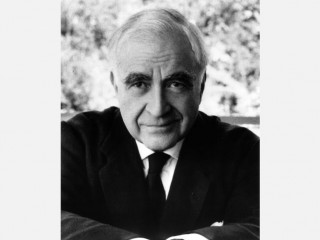
Carlos Chavez biography
Date of birth : 1899-06-13
Date of death : 1978-08-02
Birthplace : Mexico City, Mexico
Nationality : Mexican
Category : Famous Figures
Last modified : 2011-02-11
Credited as : Conductor and composer, Mexican Symphony Orchestra,
Carlos Chávez was a Mexican conductor and composer. By taking the lead in introducing national and folk elements to express the spirit of his country, he became the founder of modern Mexican music.
On June 13, 1899, Carlos Chávez was born in Mexico City, where he studied piano under Manuel M. Ponce and Pedro Luis Ogazon. But Chávez's ability as a composer was acquired primarily from direct observation and study of works by the great masters.
From a very early age Chávez felt the need to create a style and personality of his own. His first works, written in 1921, marked him as an innovator and alarmed the musicians who had been educated in the romantic European tradition. Jose Vasconcelos, minister of education, then commissioned Chávez to compose a ballet entitled El fuego nuevo (The New Fire), in which he introduced some instruments and elements which were considered to have existed in Mexico before the time of the Conquest.
In 1928 Chávez and the Mexico City Syndicate of Musicians founded the National Symphony Orchestra, which a few months later became the Mexican Symphony Orchestra. He devoted all his efforts to stimulating the musical life of the Mexican capital as well as, on a lesser scale, that of the rest of the country. In 1928 Chávez was appointed director of the National Conservatory of Music, and the following year he established the Conservatory Choir.
Becoming deeply interested in the problems of constructivist music depicting the machine age, Chávez composed his operatic ballet, H. P. (Horse Power), to symbolize the economic relationship between the industrial United States and the agricultural tropical lands. The ballet was first produced in Philadelphia in 1932.
Chávez was named chief of the Department of Fine Arts in Mexico City in 1933. The next year he left the conservatory to devote himself exclusively to the Mexican Symphony Orchestra. He was guest conductor of the Boston Symphony Orchestra in 1936 and of the New York Philharmonic Symphony Orchestra in 1937. In 1946 he became director of the National Institute of Fine Arts in Mexico City.
Chávez conducted the first performance (1953) of his Fourth Symphony with the Louisville Orchestra, which had commissioned it. During the academic year 1958-1959 he was Charles Eliot Norton lecturer at Harvard University; his lectures were published as Musical Thought (1960). In 1960 he helped implement the Composer's Workshop which is held at the National Conservatory. Before his death in 1978 he was awarded honorary memberships in the American Academy of Arts and Sciences and the American Institute of Arts and Letters.
Works by Chávez include six symphonies, a piano concerto, two violin concertos, a concerto for four horns, the Ballet of the Four Suns, the Ballad of the Sun, Flames, and the opera Love Propitiated. The Toccata for Percussion is perhaps his best-known work.
















